
If you have a website, the real question isn’t whether you’re on Google, but whether the answer Google reads out loud will be yours. If you want to know how to write content that both people and voice assistants can recognize, keep reading. This could change the way you write - and the way people find you.
Imagine this: you’re driving and suddenly remember you were supposed to order flowers for a birthday. You can’t type at that moment, so you say: “Hey Google, where can I buy flowers in Zadar?” In less than a second, Google reads you the most relevant answer. This is voice search. And it happens more often than you think.
If you have a website and haven’t yet thought about how people “listen” to you - not just read you - you might be invisible to those who use voice search.
Voice search is quickly becoming a habit. People “ask” their devices because it’s quicker, more natural, and more convenient than typing.
And most importantly - if you have a website, you want to be among the first answers to those questions.
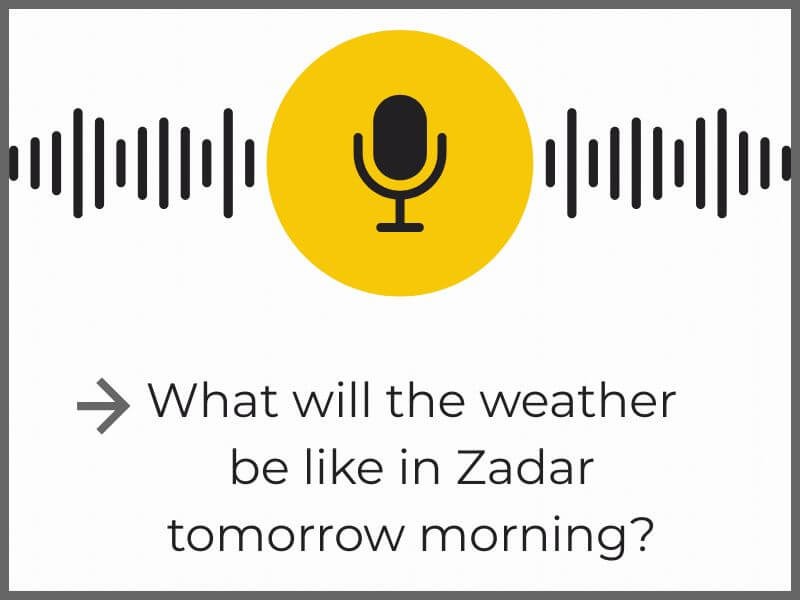
Voice search is a way of finding information by speaking instead of typing. Instead of typing a keyword into a search engine, a person speaks a question or command.
The device recognizes the spoken words, converts them into text, and searches for the most appropriate answer.
This type of search is becoming more common in everyday life - for example, when your hands aren’t free or when speaking simply takes less time than typing.
The most well-known voice assistants that understand Croatian or English include:
In Croatia, Google Assistant is the most commonly used, mostly on mobile phones, especially when quick information is needed without much searching.
Voice search isn’t the same as the traditional one done via keyboard. It differs in several ways:
Voice search works like a conversation. People speak as if they’re talking to a person, not a device. That’s why the text on your website should sound like a real answer to a real question.
People are already searching for information this way while sitting in the car, walking through town, or making dinner. If you don’t answer, someone else will.
If a page contains a simple and clear answer, it’s more likely that the voice assistant will choose it and read it out loud.
Research figures show the following:
Accurate data for Croatia is not yet available, but it’s clear that search habits are changing here as well. Speech, smartphones, and faster networks are changing the way people look for information.
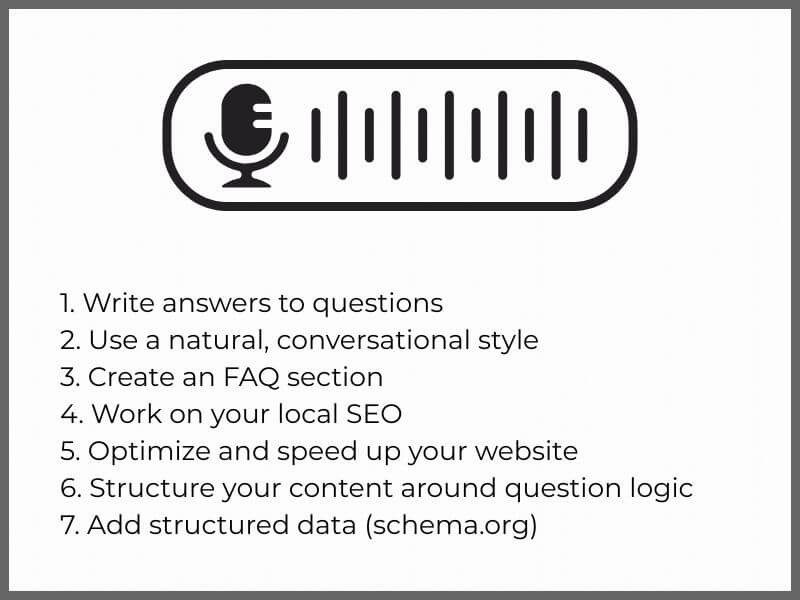
When someone searches for something they’re interested in, they usually type short phrases like: “pizzeria Zadar.”
But when they ask the same thing out loud, they usually say: “Where can I get a good pizza in Zadar?”
The difference is clear. With voice search, the tone is conversational, the language is natural, and it’s usually a question someone would ask in real life instead of using keywords. Google and other search engines know this and look for answers that “speak” the same language.
So how can you adapt your content for voice search?
Here’s what you can do if you want voice assistants to both “hear” you and recommend you:
Instead of dry sentences, use questions and clear answers. For example:
Question: How many calories are in a banana?
Answer: A medium-sized banana has about 100 calories.
Search engines like this format because they can pull it as a featured snippet, a short answer read aloud.
Forget stiff phrases full of keywords.
Instead of: “Best hair salon Zagreb”
Write: “Our salon in Zagreb welcomes clients without an appointment, every day from 9 a.m. to 8 p.m.”
This kind of content matches the way people actually speak when searching: “Where in Zagreb can I get a haircut without an appointment?”
That increases the chance of being selected by a voice assistant as the most relevant result.
Frequently asked questions are ideal for voice search. Google prefers answers that are short and clear.
Examples:
Most voice queries are about something nearby, for example: “Where can I buy fresh fish near me?” or “Which hairdresser is open on Sundays in Split?”
Be sure to register on Google Business Profile and regularly update details such as:
Voice searches mostly come from mobile devices. If your site is slow or doesn’t display well on phones, it will be hard to appear in voice results.
We recommend:
Add sections like:
This helps both readers and search engines better understand your content.
These are small tags in your site’s code that tell Google what is your address, what are your opening hours, and what is your customer rating. Without them, Google has a hard time connecting that information to your site.
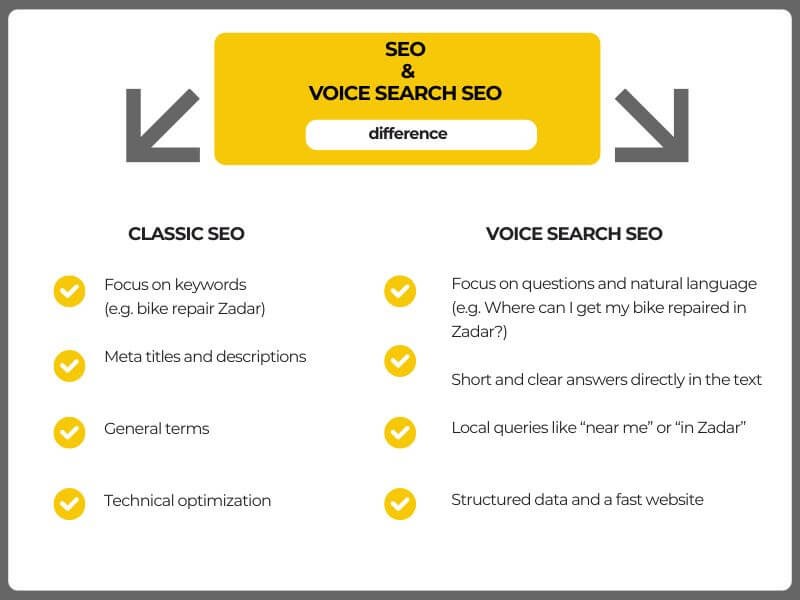
Although both have the same goal - bringing people to your website - the way it’s done is different. When typing, people search using short phrases, while when speaking, they ask full questions.
This means the content needs to be adapted to these different habits.
In other words, classic SEO “writes for the eyes,” while voice SEO “writes for the ears.”
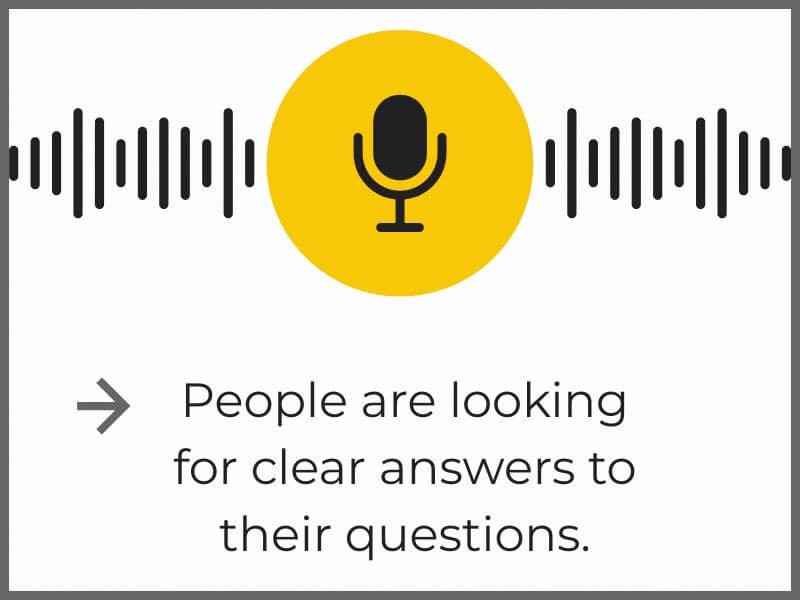
People who search aren’t looking for your slogans - they’re looking for clear answers to their questions. If the content on your website answers those exact questions, there’s a greater chance that voice assistants will recognize it and read it out loud.
Here’s an example of what that can look like:
Instead of: Our dental services are high-quality and available at affordable prices.
Write: Wondering how much teeth whitening costs in Zadar? Our prices start at 60 euros, and all treatments are performed by an experienced team of dentists with over 15 years of practice.
Instead of: Our pizzeria offers the best pizza in town.
Write: Looking for pizza in Pula? At our pizzeria Margarita, you can order wood-fired pizza starting at 7 euros, every day from 11 a.m. to 11 p.m.
Instead of: Apartments near the sea Vir.
Write: Wondering where to stay overnight? Our apartments are located 200 meters from the main beach in Vir, and each room has a balcony with a sea view.
Instead of: We sell sports shoes from well-known brands.
Write: Want to know where to buy Nike sneakers in Zagreb? In our store in Arena Center, we offer the latest models, with prices starting at 50 euros.
Instead of: Our clinic provides emergency services.
Write: What to do when you have a toothache at night? Our emergency clinic in the center of Split is open 24 hours a day.
Instead of: We offer apartment cleaning services.
Write: Need your apartment cleaned in Split or nearby? Our team arrives the same day, and prices for a one-bedroom apartment start at 40 euros.
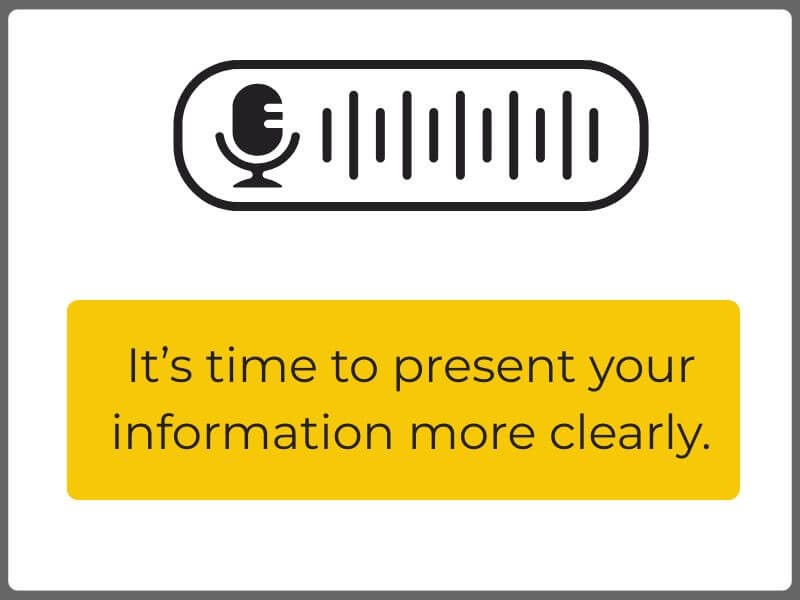
What’s interesting about voice search is that there doesn’t even need to be a click on the website.
The voice assistant simply reads the answer it finds most clear, or the one it pulls from “featured snippets” or its own data sources.
Voice assistants like Siri, Google Assistant, Alexa, and Gemini choose websites that speak in a “natural” language.
If your content doesn’t match the way people actually ask questions, it will be hard to appear among the results.
And if it seems like your website has everything, but people still aren’t finding you, maybe it’s time to present your information more clearly.
At Zona plus, we help shape content that both people and voice assistants can understand.
Have a question or don’t know where to start? Feel free to reach out - we’re happy to simplify the process.
Source: Statista